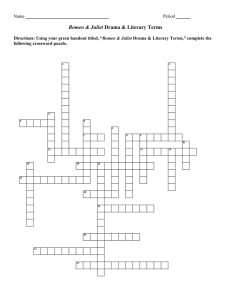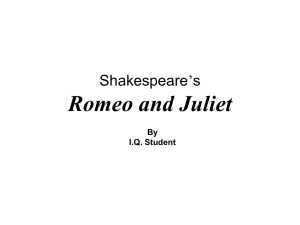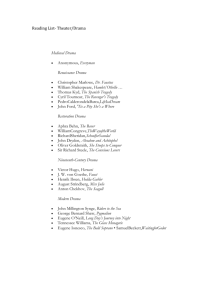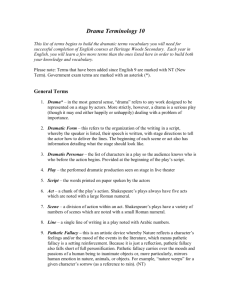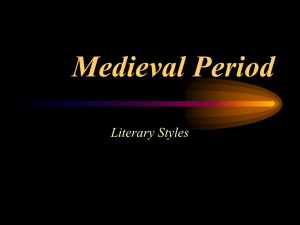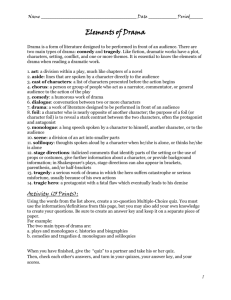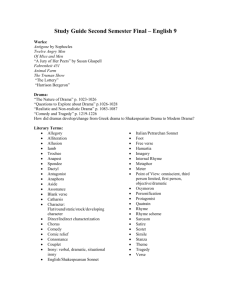Romeo and Juliet Drama and Literary Terminology 2
advertisement
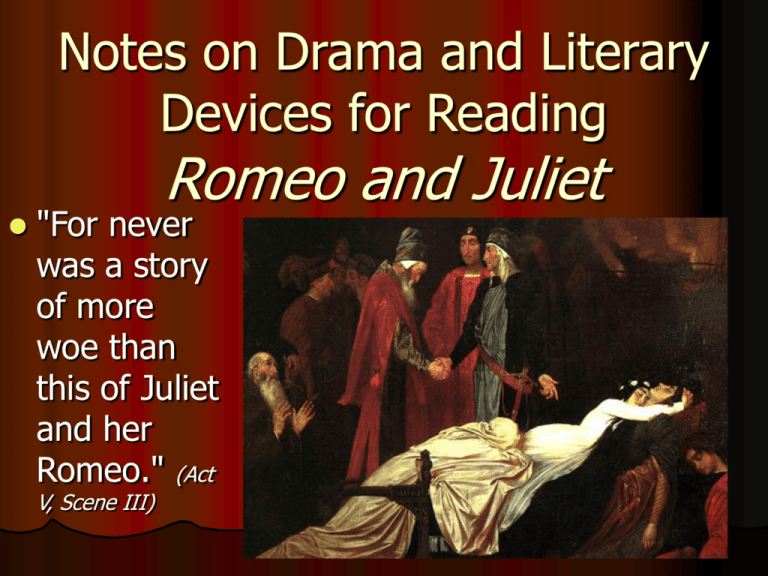
Notes on Drama and Literary Devices for Reading Romeo and Juliet "For never was a story of more woe than this of Juliet and her Romeo." (Act V, Scene III) Drama Drama is meant to be seen or performed, not read. Drama becomes a play when it is acted out. Drama contains elements just like a novel or a short story: plot, characters, setting, and theme. Drama also contains different elements: lighting, sets, props, and costumes. Drama began as an outdoor event. Stage Direction is what we call the writing that tells actors where to move and the behind the scenes people what to do. Tragedy Tragedy is a type of drama that began in ancient times. Tragic hero is the character who is brought down by a single weakness. The weakness that brings down the hero mentioned above is called the tragic flaw. The word Tragedy comes from the Greek word, “tragos,” meaning “goat song.” Tragedies, Comedies and Catharsis Even in tragedies, there is usually some comedy. Comedy is a type of drama where the hero overcomes his flaws and triumphs in the end. Catharsis literally means “a cleansing.” If you experience catharsis at the end of a play, you are relieved that the tragedy happened to a character and not you. Romeo and Juliet: Literary Terminology for Act I What do ya call it when actors are talking? Soliloquy is a speech in which one character is alone on stage expressing his/her thoughts to the audience. Dialogue is conversation between characters. Monologue is a speech in which one character is talking, but there are other characters on stage. Aside A part of an actor's lines supposedly not heard by others on the stage and generally intended only for the audience. Blank Verse is any verse comprised of unrhymed lines all in the same meter, usually iambic pentameter . “Mending Wall” by Robert Frost Something there is that doesn't love a wall, That sends the frozen-ground-swell under it, And spills the upper boulders in the sun, And makes gaps even two can pass abreast. Couplet are any two lines working as a unit, whether they comprise a single stanza or are part of a larger stanza. Most couplets rhyme (aa), but they do not have to. Into my empty head there come a cotton beach, a dock wherefrom I set out, oily and nude through mist in oily solitude Lady Montague: “O, Where’s Romeo? Saw you him today? Right glad I am he was not at this fray.” Epithet A characterizing word or phrase firmly associated with a person or thing and often used in place of an actual name, title, or the like, as “man's best friend” for “dog.” Dramatic Foil A character that by contrast underscores or enhances the distinctive characteristics of another Dramatic Irony Dramatic irony is a device whereby a character’s words or actions have one meaning for the character and quite a different meaning for the audience. Iambic Pentameter A type of meter that is used in poetry and drama. It describes a particular rhythm that the words establish in each line. That rhythm is measured in small groups of syllables; these small groups of syllables are called 'feet'. The word 'iambic' describes the type of foot that is used. The word 'pentameter' indicates that a line has five of these 'feet'. Da Dum Da Dum Da Dum “To Be or Not to Be” Iambic Meter An end stressed two syllable foot. Unaccented syllable followed by an accented syllable Da DUM = One Iamb Pun The humorous use of a word or phrase so as to emphasize or suggest its different meanings or applications, or the use of words that are alike or nearly alike in sound but different in meaning; a play on words. EXAMPLE: Mercutio: “Ask for me tomorrow and you shall find me a grave man.” (“Grave” meaning both “serious” and “dead”). Know these Terms! End of Notes
